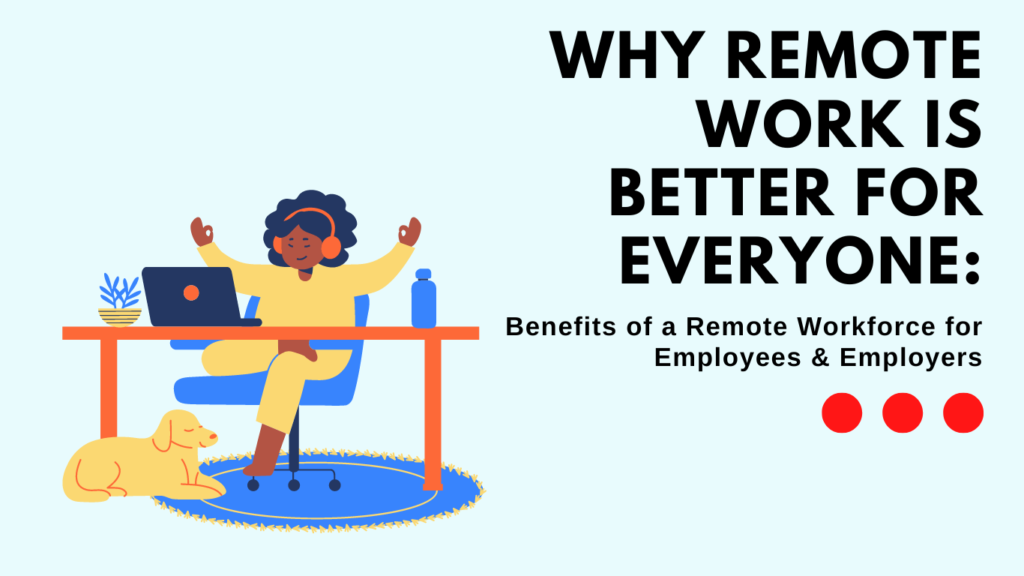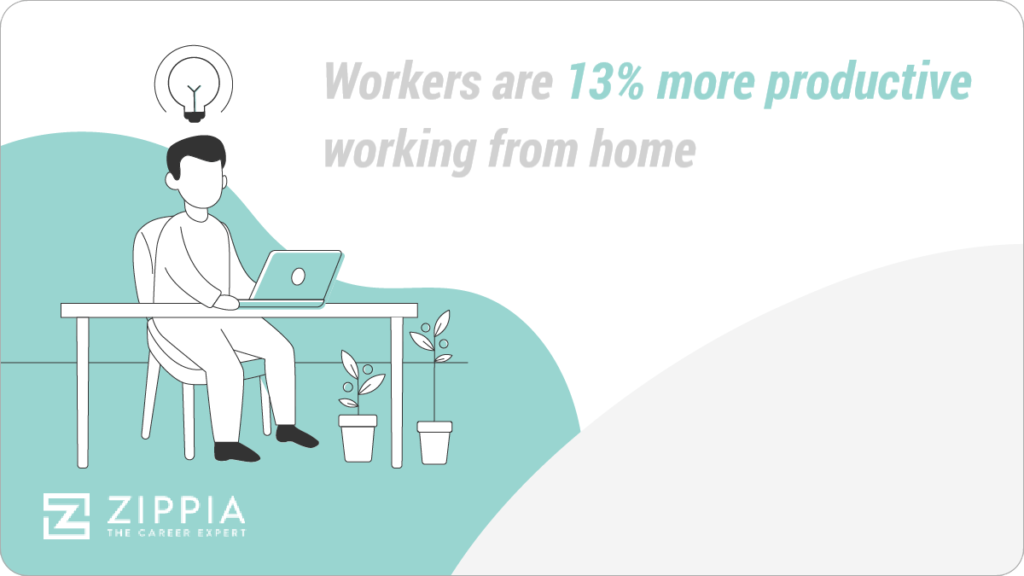Why remote work is better for everyone

A remote workforce is becoming an increasingly popular option for both employees and employers. There are many benefits to working remotely, and it’s a great solution for both sides of the employment equation.
In this blog post, we will discuss the reasons why a remote workforce is better for everyone involved. We’ll look at the benefits that remote work provides for employees and employers alike. If you’re considering a remote work arrangement, or if you’re just curious about what it’s all about, this post is for you!

Before the COVID-19 pandemic hit remote work was considered a very special perk that only a very small percentage of workers could enjoy. The pandemic has changed all of that, and now remote work is seen as a necessary option for many employers and employees. If we look at some numbers, according to Robert Half, 65% of millennial workers and 55% of working parents would likely quit if their work decides to be called back to the office full-time.
Therefore, as an employer, you need to be careful to not turn your back on remote work as it can lead you to face great turnover
Fortunately, in this post-pandemic workplace, most companies are combining flexible work strategies turning the future of work officially into a hybrid model. McKinsey surveyed 100 CEOs, vice presidents, and people of similar positions across industries and around the globe.
The survey came up with the conclusion that the majority of executives anticipate that employees will be on-site between 21 and 80% of the time, or one to four days a week, for all roles that are not essential to complete on-site.

The pandemic has forced organizations to move faster in their digital transformations and many of them are seeing the benefits of a remote workforce
Trying to force employees to come back to the office five days a week is not going to work in this new world. We need to be flexible and adaptable, and that means embracing remote work as a viable option for everyone involved.
Let’s remember that remote work is: Any type of work that is done outside of a traditional office setting. This can include working from home, working from a co-working space, or even working from a coffee shop or library.

Benefits of Remote Work for Employees:
There are many reasons why a remote workforce is better for everyone involved. We’ll look at the benefits that remote work provides for employees and employers alike:
Increased Flexibility and Freedom
This benefit is the most common and cited reason people choose to freelance or engage in remote work. And for good reason! With remote work, professionals are no longer beholden to the 9-5 workday, giving them the ability to take on work that can be done at any time of day. This increased flexibility and freedom also extend to where work can be done.
No longer tied to a specific geographical location, giving remote workers the upper hand when picking up and working from anywhere in the world with an internet connection. As well as providing endless opportunities for professionals seeking new and interesting work environments.
Remote workers have a better work-life balance and overall improved mental health, also a sense of well-being and life satisfaction
Finally, it allows workers to tailor their working hours around other commitments such as childcare or eldercare, meaning they can still lead active social lives outside of work.
Reduction in Commuting
According to Zippia, the average commute time in the United States is 27.6 minutes each way, meaning is a whole 55 minutes round trip every single day. This is without taking into account employees who take public transportation.
Think about those who have to commute during rush hour and how commuting can quickly add up to a huge time commitment!
In addition to the time commitment, there is also the cost of commuting which can range from gas money, public transportation costs, and vehicle maintenance.
And finally, there’s the impact that commuting has on our mental and physical health. Studies have shown that long commutes are linked to higher levels of stress, anxiety, depression, and even obesity.
So it’s no wonder that avoiding a commute is one of the biggest benefits of remote work!
Increased Ability to Focus
Remote working arrangements and the ability to design your own office space can lead to increased productivity and decreased distractions.
When you’re not commuting, you have more time in the day to get things done. And when you’re able to design your own work environment, you can optimize it for maximum focus and concentration.
Some studies have even shown that employees who work from home are 13% more productive than their office-based counterparts!

Fewer Distractions
When we sit to break down all the distractions at work, we can end up with a loooong list. For example, smoke breaks can take up to around 40 hours a month per employee while according to Teamworks, each employee loses 65 hours of productivity annually due to 15-minute gossip or cooler talk sessions.
Imagine the time lost on those who gossip while smoking!
Yes, there are endless distractions that can pull you away from being productive at work. And while some people might thrive in an environment with lots of activity and noise, others do better when they can focus on their work without interruption.
Remote work gives employees the ability to minimize distractions and create a work environment that is conducive to concentration and productivity.
Get more out of your business
Get the best employee engagement content every week via mailing list
Promotes Better Workplace Technology
There is an increased demand for technology that helps employees stay connected and productive when working remotely. This has led to the development of a whole host of new tools and applications designed to make remote work easier and more efficient.
Some of these include project management software like Asana or Trello, employee trackers such as Monitask, video conferencing applications like Zoom or Google Hangouts, and file sharing and collaboration tools like Dropbox or Google Drive.
Remote employees are often able to use the latest and greatest technology available which can lead to increased efficiency and productivity
In an office setting, it can be difficult to keep up with the latest technology trends as there is usually a lag time between when the new technology is released and when it is adopted by the company.
By investing in the right technology, employers can set their remote employees up for success!
Benefits of Remote Work for Employers:
Reduced Overhead Costs
For companies, one of the most appealing aspects of remote work is the reduced overhead costs. By eliminating the need for office space, utilities, and other related expenses, companies can save a significant amount of money.
- Rent and utilities are two of the biggest expenses for any business, but they can be especially problematic for small businesses. By eliminating the need for office space, businesses can save thousands of dollars each month. In addition, remote work reduces the amount of energy used for heating, cooling, and lighting, which can further lower operating costs.
- Cleaning services are an important part of maintaining a healthy and productive workplace. However, they can also be a significant expense for employers. By eliminating the need to clean office space, employers can save money on cleaning services.
- Food, though often thought of as a perk, company-provided meals can end up costing employers a lot of money. When employees are working from home, they are more likely to prepare meals themselves. This can cut down on the number of lunches needing to be provided by the company, as well as the associated costs.
- Taxes, if employees are working remotely, they may be eligible for a tax deduction. This deduction can be significant, and it can save employers thousands of dollars each year. In addition, remote work can also help to reduce other tax costs, such as payroll taxes.
Attract Top Talent
Attracting top talent is essential for any employer who wants to stay competitive. In today’s economy, workers are increasingly looking for jobs that offer flexibility and the ability to work remotely.
When you’re not limited by geography, you can expand a wider net and hire the best employees for the job, regardless of where they live.
This is especially beneficial for companies in small towns or rural areas that might have a difficult time attracting top talent from larger cities
By offering remote work options, employers can cast a wider net and attract the best and brightest from around the world. Not only does this give employers access to a larger pool of talent, but it also allows them to tap into a more diverse range of perspectives and skillsets.

In today’s increasingly globalized economy, there is simply no reason to limit oneself to local talent!
Improved Employee Retention
According to many studies, remote work reduces employers’ staff turnover rates by 25–50%, of course retaining employees also helps to reduce the money that can cost a hiring process.
Improved employee retention is a direct result of increased opportunities for remote work
Allowing employees to have more control over their work-life balance and where they complete their work leads to increased job satisfaction and a decrease in the likelihood of employees seeking new opportunities elsewhere.
Improved Job Satisfaction
A recent study by Gallup found that employees who can work remotely are more engaged and satisfied with their jobs. In addition, remote employees are less likely to experience burnout than their counterparts who work in traditional office environments.
This is due to the increased control that remote workers have over their schedules and working environment. By allowing employees to create a schedule that works for them, and by giving them the freedom to work from anywhere, employers can significantly improve job satisfaction levels.
Reduction in Absenteeism
Inevitably, there will always be times when employees need to take a day off. Whether it’s for a doctor’s appointment or to deal with a personal issue, certain things simply can’t be helped.
However, remote work can help to reduce the time employees need to take off
This is because remote workers have more control over their schedules and can often complete their work from home, even if they are not feeling 100%. When employees can work from home, they are less likely to miss work due to sickness or personal emergencies.
Eliminate Unnecessary Meetings
Eliminating unnecessary meetings is vital for the employer. Long term, it ensures that the company’s money is being spent in the most efficient way possible. Meetings take up a lot of time and energy, which could be used to actually get work done.
In the remote work age we’re living in, there’s no need for most meetings. They can easily be replaced by a simple email or Slack message. This would save a lot of time and money for employers, as well as make their employees happier and more productive.
Employers who eliminate unnecessary meetings and allow remote work can achieve greater productivity and improved work-life balance for their employees
There are many benefits of remote work for both employees and employers. Some of the key benefits include increased job satisfaction, improved employee retention, and a reduction in absenteeism.
If you’re an employer, offering remote work options is a great way to attract top talent and improve job satisfaction levels among your employees. And if you’re an employee, working remotely can give you greater control over your schedule and working environment.
Takeaway
In conclusion, there are many reasons why remote work is better for everyone. From increased productivity and engagement to lower costs and improved retention, the benefits of a remote workforce are vast and far-reaching.
If you’re an employer, there’s simply no reason not to offer remote work options to your employees. And if you’re an employee, what are you waiting for? Start looking for your perfect remote job today!
Looking for a remote job? Check out our blog post on overcoming the challenges of remote working here. We hope you have enjoyed our article. Stay tuned for more!
-The Monitask Team


